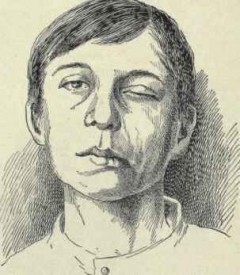 Facial neuropathy, or facial nerve palsy, is a nervous system disorder that is usually caused by another disease which is referred to as the primary disease. The most common primary diseases that are associated with facial neuropathy are autoimmune deficiency disorder, Lyme disease, or the presence of a tumor that affects the normal operation of the cranial nerves.
Facial neuropathy, or facial nerve palsy, is a nervous system disorder that is usually caused by another disease which is referred to as the primary disease. The most common primary diseases that are associated with facial neuropathy are autoimmune deficiency disorder, Lyme disease, or the presence of a tumor that affects the normal operation of the cranial nerves.
Symptoms
The symptoms are highly diverse from one individual to another and range from headaches, facial drooping especially of the cheeks, facial paralysis, and difficulty with muscle movements of the face.
It is common for the symptoms to present themselves on only one side of the face. In other words, the patient may have a drooping eye lid or cheek on only one side of the face. He may have difficulty with making fine motor movements on only one side of the face.
A common symptom is increased sound or sensitivity in one ear, or pain inside or behind an ear. Sometimes there is a loss of sensitivity in the taste buds, making food taste bland and without flavor. Sometimes there is stiffness in one side of the face, or perhaps one side of the face feels stretched tight to that side. Spasms of the facial muscles are also common.
Treatment
Because there are so many different primary causes for facial neuropathy, there can often be a quite extensive series of tests that need to be performed in order to pinpoint the underlying cause. And unfortunately, in quite a high percentage of cases no determination can be made as to the cause.
If the primary disease can be determined and eliminated, usually the symptoms of facial neuropathy disappear on their own. For those patients to have found a diagnosis illusive, it can be a quite distressing predicament to not know what is causing their symptoms.
Treatment may involve the use of antiviral drugs as well as anti-inflammatory steroids. Ointments may be prescribed to numb facial muscles and relieve pain, and eye drops can be prescribed for inflammation and other eye problems.
Prognosis
Just as the symptoms and treatments for facial neuropathy are highly varied, so is the prognosis. If the underlying cause can be determined and successfully treated, the chance of successfully reducing or eliminating symptoms of neuropathy in the face are quite high.
Some people find that their symptoms go away completely while others report that their symptoms never go away. It can largely depend on how quickly the primary disease is caught and treated, and how far the damage to the facial nerves has progressed. If the damage is not extensive, nerve cells do have a limited capacity to regenerate and heal themselves.
Peripheral Neuropathy Treatment
 |  |  |  |
| Penetrex® | Nerve Support Formula Vitamins | Neuropathy Cream | Neuropathy Rubbing Oil |


Julie
I was in an automobile accident and was hit by a grain truck in 1987 it broke my neck and from that day I went to a neuroligist and had this test done. But he would not say it was from the wreck.I had a abnormal NCS suggesting a demyelinating sensory and motor peripheral neuropathy since 1987 and for over a year now have constant numbness in my face. I also have RA and between the two I am very flustrated. I went to the neuroligist this week and he wants me to go to a pain management. I can barely walk , move etc. I quite my job because I knew i can no longer perform my duties. constant pain. Do you have any idea what could be going on with me.